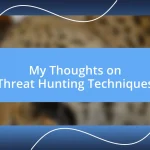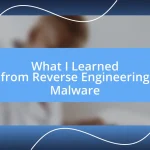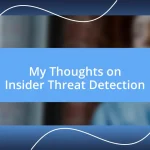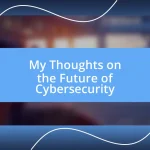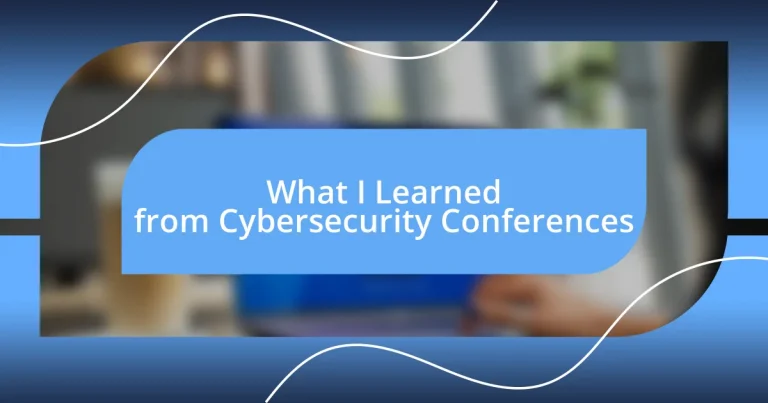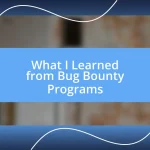Key takeaways:
- Cybersecurity conferences provide essential networking opportunities, fostering collaborations that can lead to innovative solutions and partnerships.
- Workshops at these events offer hands-on learning experiences, reinforcing the importance of practical skills and real-world applications of cybersecurity knowledge.
- Future trends in cybersecurity, such as AI and mental health awareness, highlight the need for integrating technology and well-being into professional development to enhance overall industry resilience.
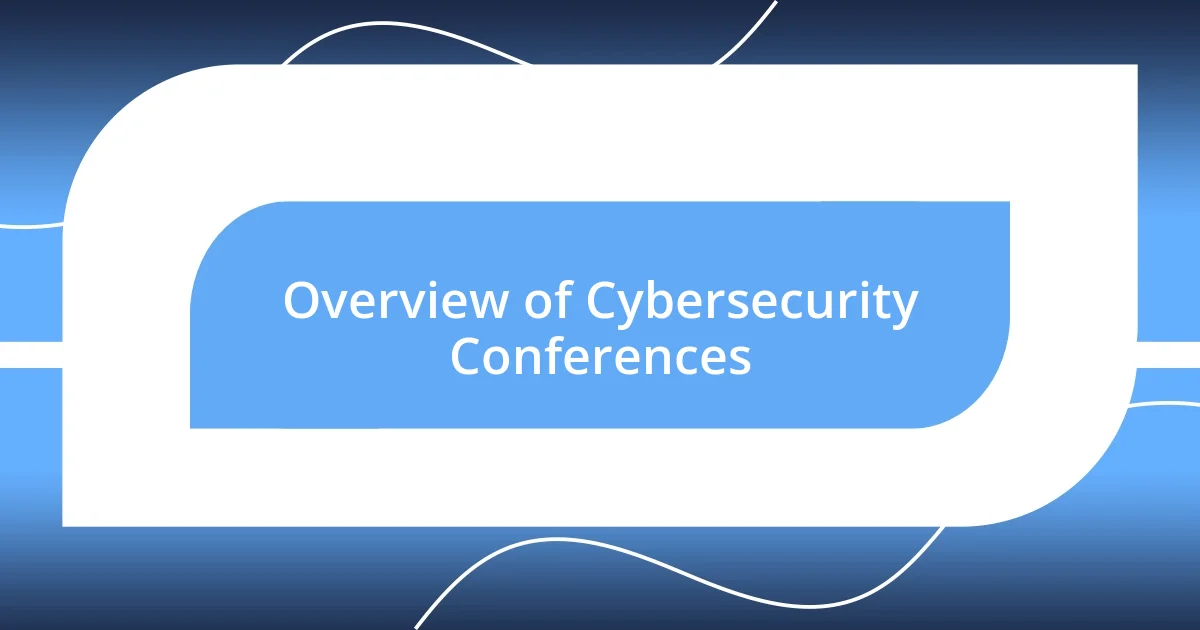
Overview of Cybersecurity Conferences
Cybersecurity conferences serve as vital hubs where professionals from various backgrounds converge to share insights, trends, and challenges. I vividly remember attending one such event where the energy in the room was palpable; it felt like a melting pot of ideas, with passionate discussions sparking in every corner. Have you ever found yourself in a space buzzing with collective enthusiasm? It truly can be inspiring to see so many experts united by a shared mission.
These conferences are not just about formal presentations; they provide invaluable networking opportunities. I once struck up a conversation over coffee with someone I considered a leading figure in threat intelligence. By the end, I walked away not only with insightful knowledge but also a potential collaboration that helped my work flourish in ways I never anticipated. Isn’t it fascinating how a simple chat can lead to transformative experiences?
In addition to networking, attending workshops during these events allows for hands-on learning and skill enhancement. I recall participating in a session that focused on incident response simulations, which gave me a real sense of urgency and the importance of preparedness. What better way to grasp the complexities of cybersecurity than by stepping into a simulated crisis? Being able to learn from one’s mistakes in real-time is invaluable.
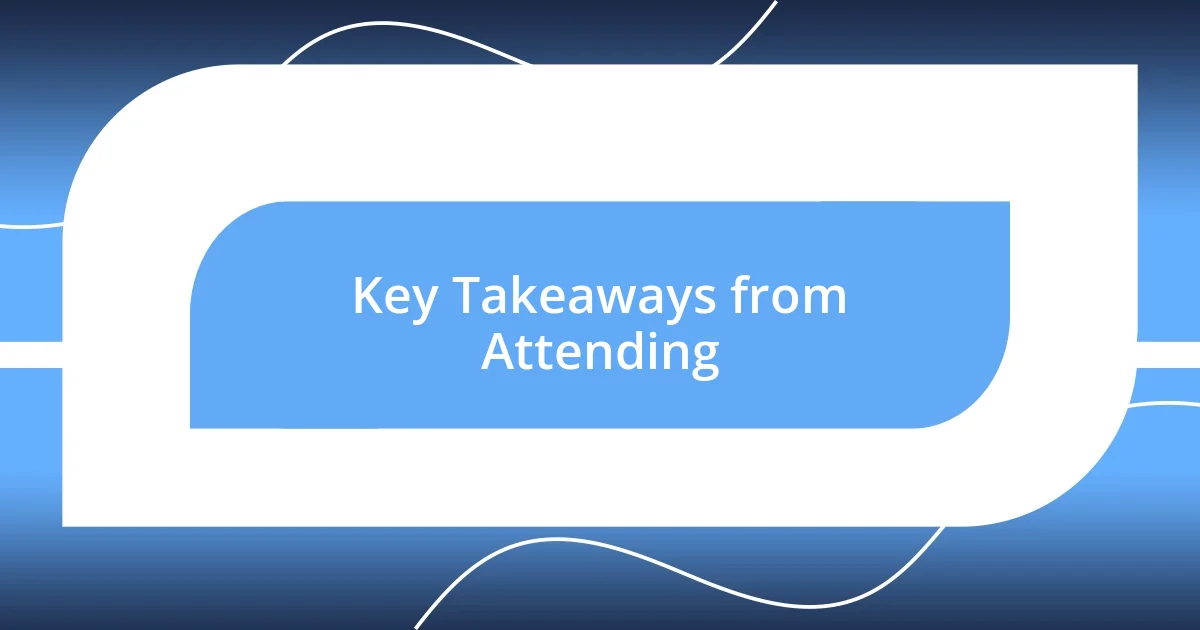
Key Takeaways from Attending
One key takeaway from attending cybersecurity conferences is the sheer breadth of knowledge available. Each session I attended felt like a treasure trove of insights. I still recall a workshop on ethical hacking that opened my eyes to new methodologies and tools I had never considered. The moments of watching experts in action reinforced the importance of practical application in understanding theory—there’s nothing quite like seeing a concept come to life right in front of you.
- Exposure to diverse perspectives that challenge my own views.
- Hands-on workshops that enhance practical skills.
- Keynote speakers who inspire and motivate with real-world successes.
- Networking opportunities that lead to meaningful connections.
- Access to the latest tools and technologies being discussed and demonstrated.
Moreover, the potential for collaboration becomes evident when you engage with various attendees. I met a startup founder whose innovative approach to threat assessment resonated with me deeply. Shortly after, we brainstormed ideas that could potentially revolutionize how we approach vulnerabilities in our projects. I walked away not just enlightened but also invigorated by the possibilities that lay ahead. Isn’t that what it’s all about?
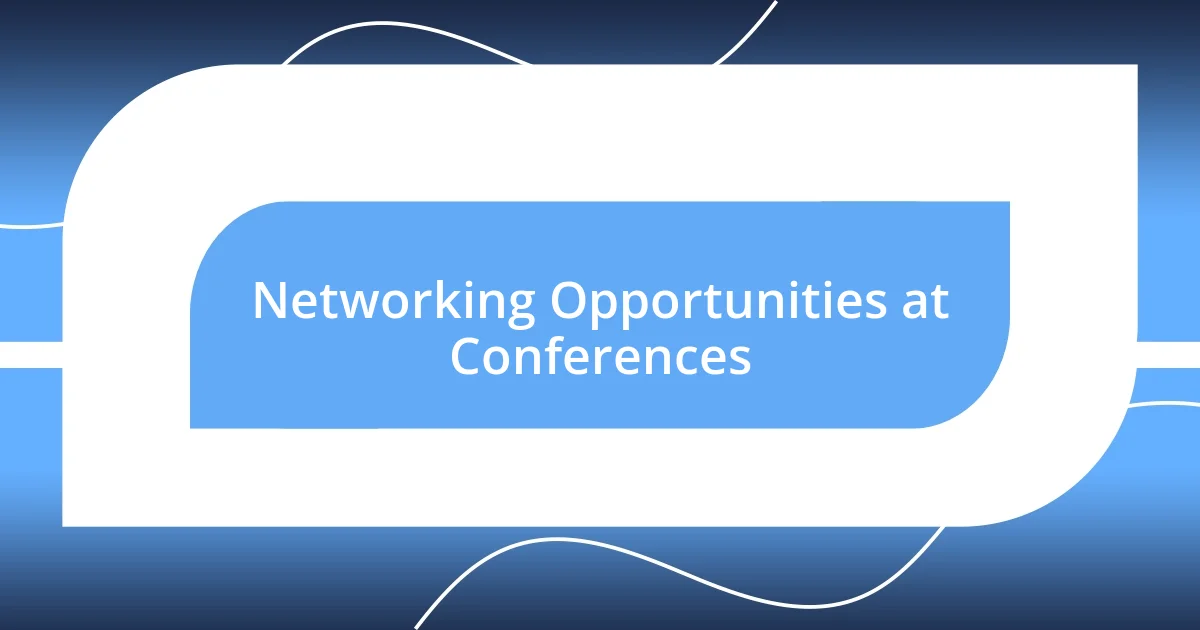
Networking Opportunities at Conferences
Networking at cybersecurity conferences is truly one of the highlights of my experience. I recall a memorable evening reception where industry leaders and budding professionals mingled in a casual setting. The relaxed atmosphere made it easy to connect with remarkable people—like the expert who shared invaluable advice on building a robust cybersecurity team. It’s in these informal moments that great partnerships often take root. Wouldn’t you agree that some of the best conversations happen over hors d’oeuvres?
Another incredible aspect of networking at these events is the ability to forge connections that go beyond just exchanging business cards. I once found myself in a breakout session where I met a fellow attendee from a different country. We bonded over shared challenges in cybersecurity, leading to ongoing conversations that have evolved into a collaborative project that spans continents. It’s fascinating how geographical boundaries can shrink when common interests bind us together.
Finally, the variety of networking formats available at conferences enriches the experience even further. From structured meet-and-greet sessions to spontaneous hallway chats, there’s no shortage of ways to engage. I often find myself gravitating toward roundtable discussions, where the intimate setting encourages everyone to share experiences and insights freely. Have you ever left a conversation feeling inspired? That’s the magic of these networking opportunities—they can turn a simple discussion into a transformative moment.
| Networking Format | Characteristics |
|---|---|
| Formal Sessions | Structured opportunities with set agendas and specific topics |
| Informal Meetups | Casual gatherings that foster spontaneous connections |
| Workshops | Hands-on experiences that encourage collaboration and skill sharing |
| Roundtable Discussions | Intimate settings that promote open dialogue and idea exchange |
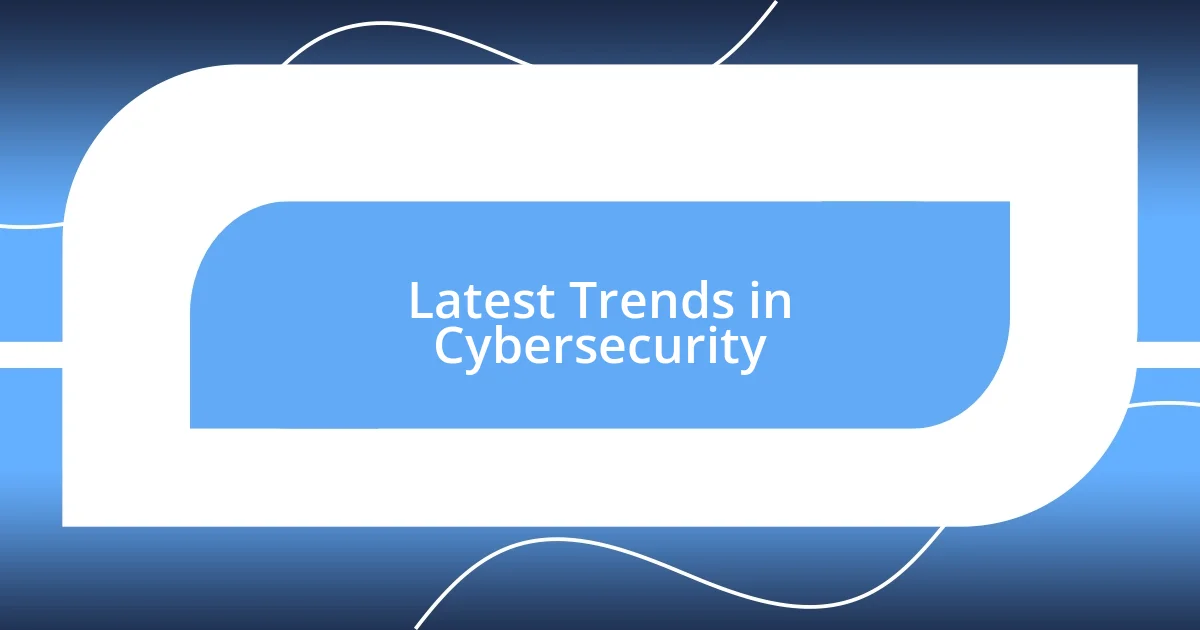
Latest Trends in Cybersecurity
Cybersecurity is a field that evolves at an astonishing pace, and I’ve noticed several trends emerging from conferences that are hard to ignore. For instance, the rise of Artificial Intelligence (AI) in threat detection has captured my attention. During one session, I witnessed a live demo showcasing how AI can predict potential breaches before they happen. Isn’t it incredible how technology can help us be one step ahead of cybercriminals?
Another trend that’s been discussed frequently is the growing emphasis on human factors in cybersecurity. We tend to focus heavily on technology, yet I learned that nearly 95% of breaches are attributed to human error. Reflecting on this, I found a session on behavioral security particularly enlightening. It made me reconsider how we train our teams. How do we cultivate a culture of security awareness? I’ve started to think it’s about fostering open conversations rather than relying solely on compliance checks.
Lastly, the spotlight on cloud security continues to shine brightly as organizations migrate to the cloud. I joined a roundtable discussion where experts shared insights on the unique vulnerabilities that arise in cloud environments. Hearing their real-life experiences helped me appreciate the importance of adopting a shared responsibility model. After all, isn’t it our responsibility to ensure that both the service provider and the user take proactive steps to secure their data? This shift in mindset emphasizes collaboration in safeguarding our digital assets.
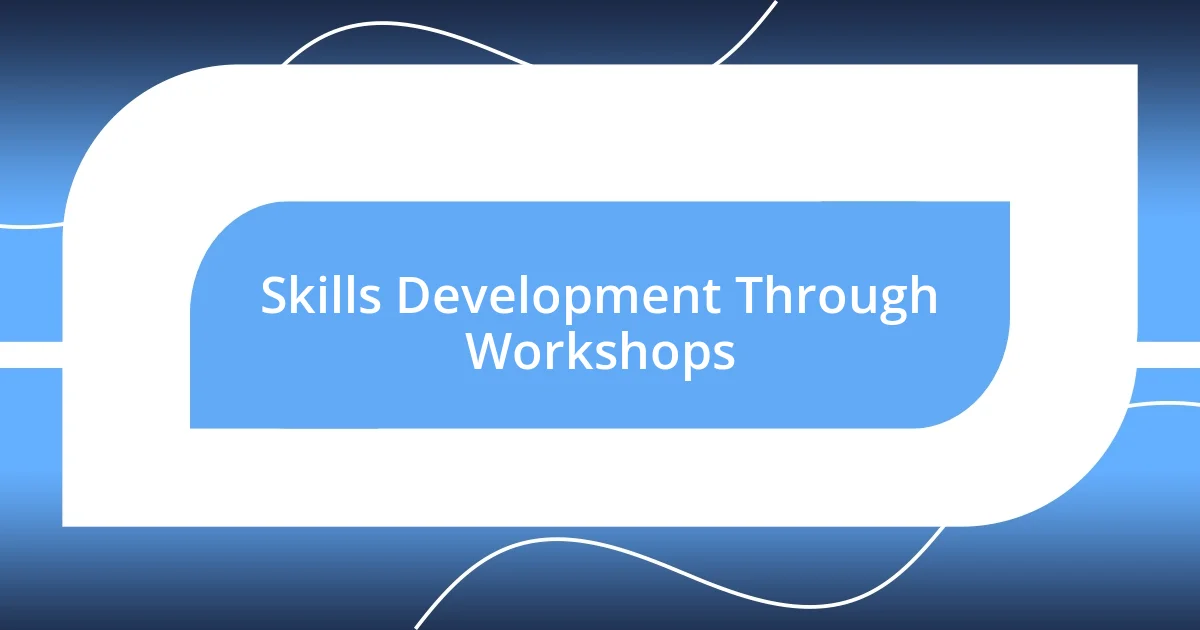
Skills Development Through Workshops
Engaging in workshops at cybersecurity conferences has been a transformative part of my learning experience. I remember attending a hands-on session focused on penetration testing techniques. As I navigated through simulated scenarios alongside industry peers, the thrill of applying new skills in real-time was electric. Have you ever felt that rush when solving a problem with your own two hands? It’s that feeling that reinforces the importance of practical application in skill development.
The collaborative nature of these workshops also stands out to me. During one particular session, we were divided into small groups where we tackled a mock incident response. Sharing different viewpoints helped us craft a comprehensive strategy. I can still recall the excitement of brainstorming ideas and learning from others’ experiences. Isn’t it remarkable how group dynamics can lead to innovative solutions we may not discover alone?
Reflecting on my workshop experiences, I’ve come to appreciate how they foster a safe space for experimentation and growth. I once attempted a new digital forensics tool, feeling a mix of apprehension and curiosity. The instructor encouraged us to make mistakes and ask questions freely—a philosophy I now carry into my own practice. This freedom to explore without judgment resonates deeply; wouldn’t you agree that a supportive learning environment is key to building confidence? Through these workshops, I’ve gained not only skills but also lasting connections and deeper insights into the ever-evolving cybersecurity landscape.

Real-World Applications of Knowledge
It’s fascinating to see how the knowledge gained at cybersecurity conferences translates into everyday applications. I recall a moment when I was back in the office, facing a potential security incident. I drew on insights from a session about real-time incident management, and it changed my approach entirely. Have you ever found yourself in a situation where everything clicked at the right moment? That feeling of applying learned concepts in real life is incredibly satisfying and reinforces the relevance of conference knowledge.
One particularly enlightening experience was during a panel discussion about emerging threats. Listening to experts share their firsthand accounts made me realize just how interconnected our security measures need to be. It felt as if they were pointing out vulnerabilities that I never considered in my own practices. I left with a fire in my belly, eager to revamp our threat assessment processes and integrate collaborative tools that could holistically address our security posture. Isn’t it amazing how real-world experiences can illuminate gaps we didn’t even know existed?
Moreover, I’ve also witnessed the ripple effect of these learnings in team dynamics. I remember implementing a new strategy based on a workshop about communication in crisis situations. The outcome was remarkable; team members felt more empowered to voice their concerns and ideas during drills. How often do we underestimate the power of effective communication? This shift made a tangible difference in our response times, proving that the application of knowledge can lead directly to improved performance and a stronger security culture overall.
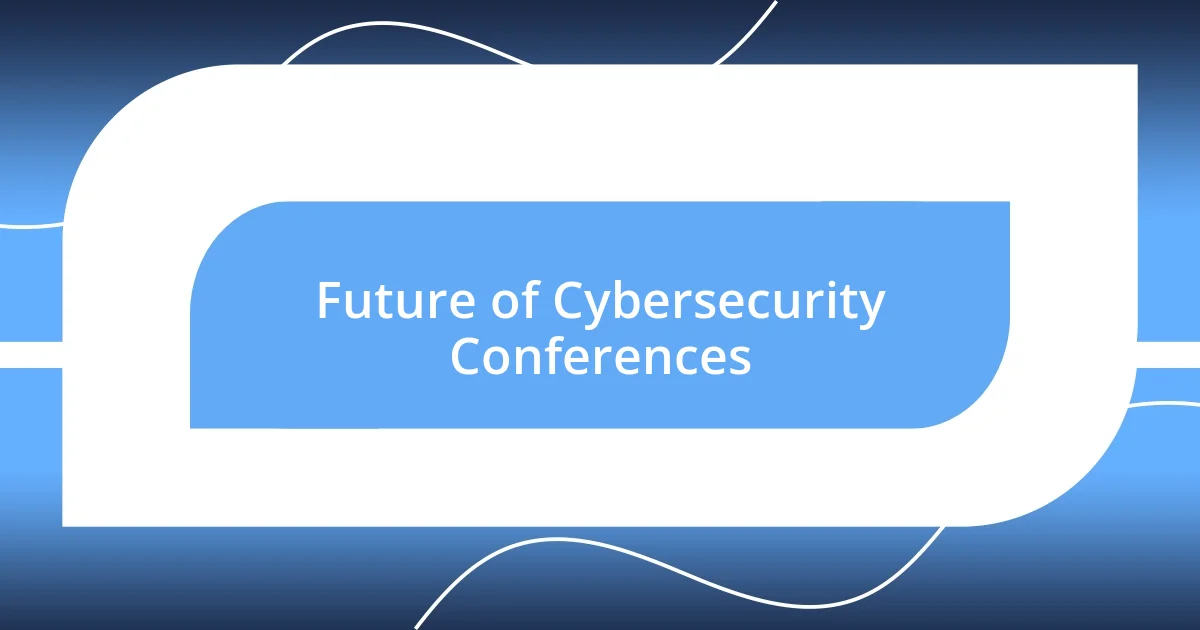
Future of Cybersecurity Conferences
As I look ahead, I can’t help but marvel at the rapid evolution of cybersecurity conferences. More than just venues for sharing knowledge, they’re morphing into dynamic ecosystems of innovation. For instance, the integration of virtual reality (VR) training sessions in future events might completely redefine participant engagement. Why not immerse ourselves in a lifelike simulation that allows us to confront and solve potential threats, right? This shift could usher in a new era of active learning, making experiences far more memorable and impactful.
I also envision the rise of hybrid conference models as a game-changer. Reflecting on my experiences, attending virtually has allowed me to connect with an international crowd I wouldn’t have met otherwise. The chance to network globally while exchanging ideas and strategies offers an enriching layer of diversity. Wouldn’t you agree that when different perspectives collide, the most innovative solutions often emerge?
Looking forward, I believe the emphasis on mental health and well-being for cybersecurity professionals will become paramount at conferences. In my journey, I’ve noticed the toll this high-pressure field can take on our minds. Sessions that focus on stress management techniques or building resilience could not only enhance our skillset but also nurture a healthier work-life balance. Isn’t it about time we prioritize our well-being alongside our skills? This holistic approach could foster a stronger, more united community, ready to tackle the unique challenges that lie ahead.

